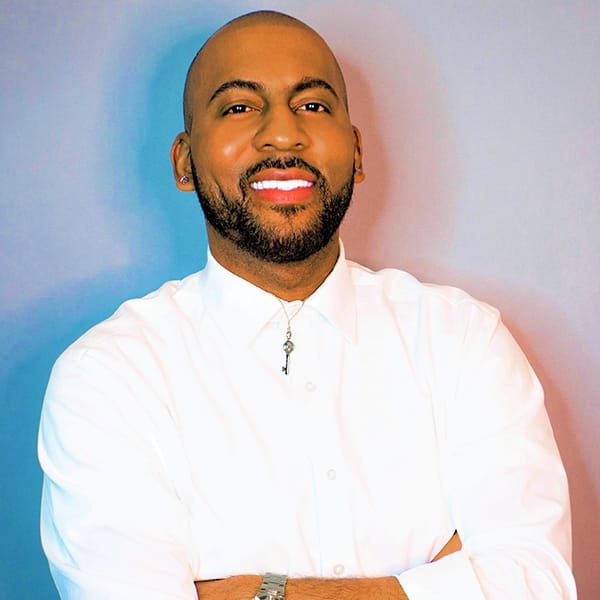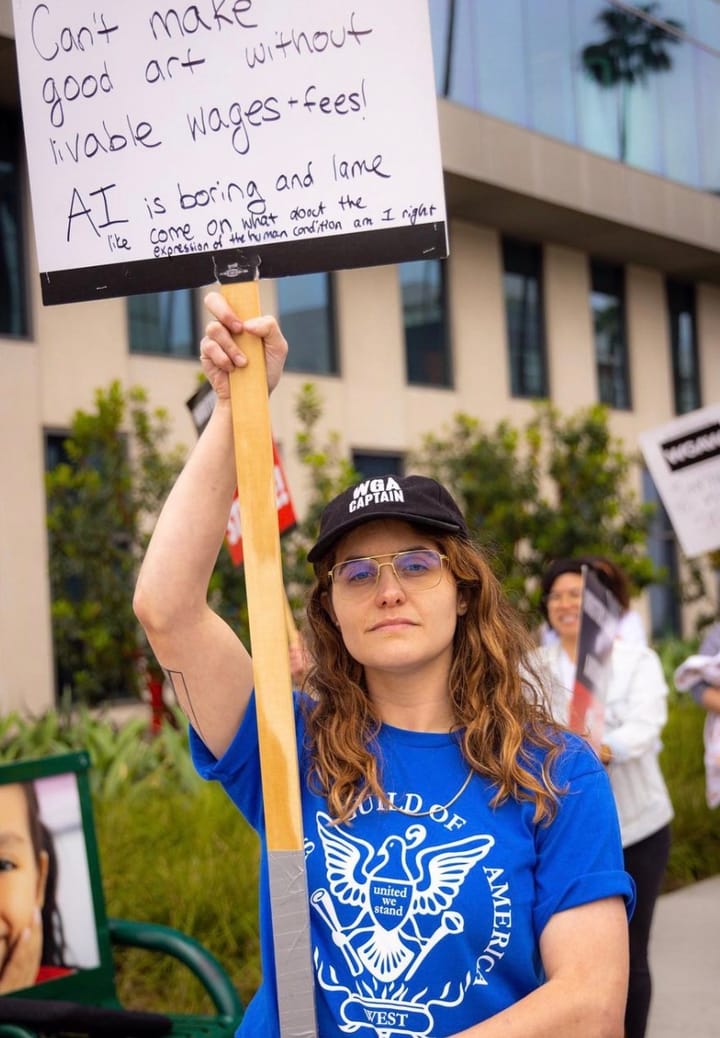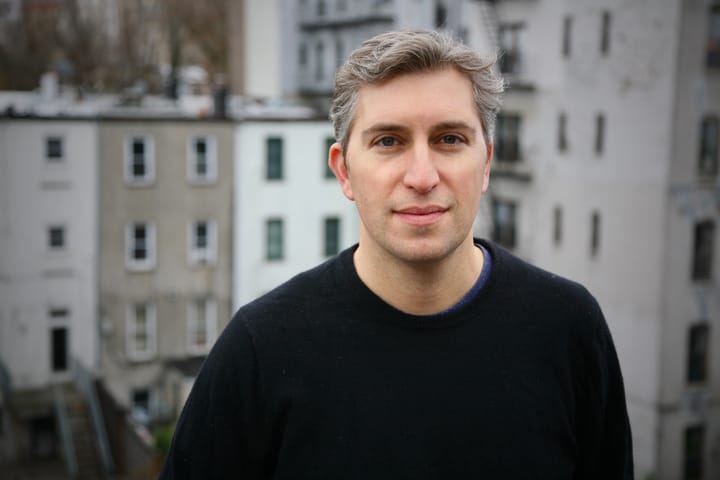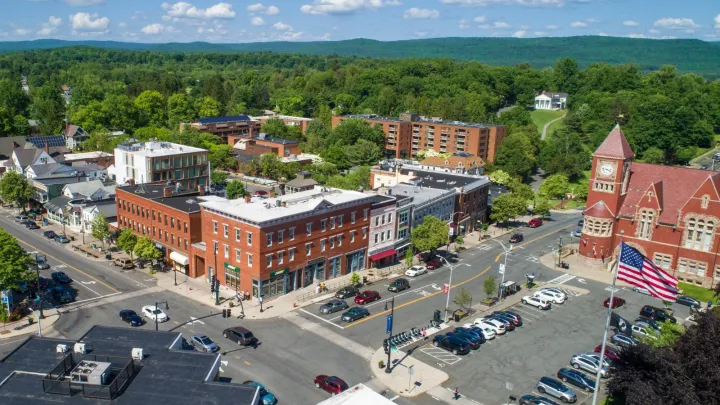Fresh Faculty: Frank Leon Roberts
Assistant Professor of English Frank Leon Roberts talks with staff writer Zane Khiry ’25 about the intersections of organizing and academics, and how he came to host “Bo's Barbershop and Books.”

Frank Leon Roberts is an assistant professor of English. He received his bachelor’s, master’s, and doctorate from New York University in 2004, 2005, and 2020, respectively.
Q: Why did you choose to come to Amherst?
A: I was interested in coming to Amherst for a couple of reasons. The first has to do with some of the transformations that have happened at Amherst over the course of the past couple of years in terms of a commitment to exploring important questions about the role of liberal arts institutions in an ever-changing world. It seems like Amherst is paving the way on those questions, and so I was interested in being a part of that conversation. Also, the English department is really special here at Amherst, in that we have a rich tradition of interdisciplinarity. As an interdisciplinary Black studies scholar whose research does not focus exclusively on literature, being in a space where I am encouraged to expand the boundaries of traditional literary studies is something that is really attractive. As a third point, I looked forward to an opportunity to be in a space where there’s a real sense of an enclosed, close-knit intellectual community. New York City is a very busy place to study and learn — learning and studying in a smaller environment like Amherst works well for me at this stage in my scholarly career. And then lastly, I came to Amherst for the same reason that people have been coming for the last 200 years: because of a tradition of academic excellence where I’m constantly learning from students like you.
Q: What initially piqued your interest in James Baldwin?
A: What piqued my interest in Baldwin is his radical commitment to truth telling. As somebody who has spent roughly two decades now as a racial justice organizer, I’m always called to writers and thinkers who dare to tell the truth in public — and James Baldwin embodies that legacy. Also, as a Black man who’s not from Harlem, but has been living in Harlem for over a decade, James Baldwin is a patron saint in that space — and so he was inescapable. I also came to Baldwin because I think that Baldwin is still America’s best democratic theorist. He is the writer who has done the best job of telling America the truth about itself. Lastly, I came to Baldwin because of the beauty of Baldwin’s writing, particularly his essays, which are unmatched in the African American literary tradition. And so all four of those reasons helped me to come to Baldwin as a writer and thinker.
Q: Your path to your PhD was very nonlinear. Could you tell us about what that was like?
A: It’s been a wonderful winding journey. And my story is a testimony, I think, first of all, to the importance of creating your own path. And then also about the importance of not rushing, and taking your time to do multiple things, with the understanding that you will arrive at your destination when it’s time. I took a long break while I was in graduate school, though while I was in the break I didn’t know it was a break, because I hadn’t actually taken a formal leave of absence from my institution. But I essentially took eight years to do movement work, when I was just organizing full time. I created a nonprofit organization. I was out organizing in the streets. I was at Ferguson, on the ground. I was, you know, shutting down highways and freeways as a part of protest movements, all with the Movement for Black Lives in New York. And I found that I couldn’t do that while also being a graduate student, so I committed myself to the work of racial justice organizing. And I began to realize that there are many front lines — that the front line doesn’t always mean being at the protests in the streets — the front line could also be being in the classroom, or being in administration, or being in an English department, or simply being on a campus where bodies like yours have not traditionally been welcomed. So for all those reasons, I came to the PhD, and ultimately completed the PhD, in order to think about the professoriate — the Academy as another site where you can engage in resistance work and protest work.
Q: Tell us about your role in the Black Lives Matter Movement.
A: The Black Lives Matter [BLM] movement is a part of a rich and long Black radical tradition of protests, rebellion, resistance, and creative organizing. So I have been involved alongside tens of thousands — millions, really — of other Americans who have been involved in movement work. Like I said, I came to the Movement for Black Lives, really, as a teacher. I was looking for an opportunity to think about what it means to not only do BLM in the streets, but to think about BLM as something that can intervene in educational space. So nine years ago, at the beginning of the movement, I created a course at NYU called Black Lives Matter, which, at the time, was the first and only course in the United States that attempted to teach the movement and the principles of the movement while the movement was actually still happening. So it’s really exciting to see nearly 10 years later, there are many Black Lives Matter courses happening on different college campuses across the country. But I’m proud that in some ways, I was a part of laying the foundation for this idea that the Movement for Black Lives is a major American social movement that deserves to be taught in the same way that we regularly teach courses on the Civil Rights Movement, the Black Power Movement, the Harlem Renaissance movement, etc. So this idea that part of the role of the insurgent Black intellectual is to bring the concerns of people outside of the academy into the classrooms of the academy as part of the pedagogical tradition that I see myself aligned with, and then connects me to how I do, and think about, the Movement for Black Lives work in an intellectual context.
Q: What do you view your role as a professor, and the role of professors more broadly, in the Black Freedom Struggle?
A: When you look at the Black radical tradition, it is clear that there is a relationship between Black organizing and Black study. What I mean by that is that all of the great organizers — whether or not we’re talking about Malcolm X, Martin Luther King, Fannie Lou Hamer, Bayard Rustin — before they were organizing, they were actually first-grade students and thinkers. So Martin Luther King’s philosophy of nonviolent civil disobedience is influenced by his readings of Gandhi. The Black Panther Party was founded by two students, Huey Newton and Bobby Seale, while they were students at a community college in Oakland. Angela Davis’ work is informed by her background as a political philosopher who wrote her PhD on the Frankfurt School’s philosophy. So what I’m saying is that there is this long tradition of racial justice work being connected to the life of the mind. And so I see my role as continuing this tradition of connecting the life of the mind to a broader project of political and social transformation. And, in fact, one of the things that is very important about Black studies as an intellectual tradition is that it is the literal merger of social justice, labor, social justice protests, and intellectual inquiry. So this idea that you can engage in intellectual work that is informed by broader public concerns is very much the tradition that I stand in as a teacher and that I try to continue.
Q: Are you doing any research at the moment?
A: I am working on a book on James Baldwin’s life as a playwright and dramatist. Very often, when we talk about James Baldwin, we talk about Baldwin as an essayist, Baldwin as a novelist — or even Baldwin as a public speaker. Rarely do we think about Baldwin as a playwright. I’m interested in how theater shaped Baldwin’s approach to the politics of what we might call ‘radical empathy:’ the idea of being willing to see one’s self in the other. I’m also interested in how theater helped teach Baldwin the art of representing the other. In other words, another way of saying this is that Baldwin understood what actors do on stage — they get on stage and they step into someone else’s shoes, or they allow themselves to lean into someone else’s experience that is not their own — that could actually be translated into a social practice that all human beings could engage in. To be human is to be willing to step into someone else’s shoes and actually approach that person with empathy. So right now, I’m working on a book that tries to think about these concerns in relation to Baldwin’s work as a dramatist. And I’m also working on a collection of essays on some of the issues that we’ve discussed in relation to social justice and pedagogy.
Q: What do you do for fun outside of research and teaching?
A: I love listening to Beyonce and listening to Frank Ocean. I’m a man of the theater, so I’m always going to the theater. The theater, I think, helps to keep me alive — and I mean, alive, in the sense that it keeps me vibrant. It keeps me connected to communities that are breathing together in a small social space, trying to ask questions about what it means to be alive. So I like doing that. I like watching TV, my guilty pleasure is Bridgerton. I’m waiting for the next season to come out. And I love continuing to be rooted in my community in Harlem, which is where I am when I’m not here in Amherst. And each week, I return to Harlem, and I walk those streets, the same streets that Baldwin walked, and Langston Hughes, and Zora Neale Hurston, and Alain Locke — and I see myself, I see myself as being a part of the path that they quite literally laid before me. So all of those things are things that I like to do.
Q: So you grew up in the Church. How has Christianity influenced your life?
A: Christianity, particularly Black Radical Christianity — the Christianity of David Walker and Frederick Douglass, as it were — has had a profound impact on my understanding of the work of liberation, and the connection between the idea that the project of liberation is also a spiritual project. To be clear, we’re not going to legislate racism away in America, right? So it’s not about changing laws. It’s also about a spiritual revolution, right? Martin Luther King spoke about this as “a revolution of values.” So I come out of that tradition, also, rhetorically, the language of the Black church, the rhetorical traditions of the Black church, as well as the biblical mandate of calling out injustice, when and where you see it, informs not only who I am as a scholar, but who I am as a human being. Also, the tradition of the Black church of allowing people to bring all of their gifts to the altar is something that I try to recreate in my classroom, so that my classroom can feel like a space where you can come down to the altar as you are, and be healed, be known, be seen and be loved. And that is something that we see in the best elements of the Black church. And I try to help recreate it in a secular context in my classroom.
Q: A tweet of yours on your practice of giving books to students went viral. What were the consequences of it, and what was that like for you
A: I now receive dozens of books every week from people who I don’t know, which is really wonderful. And those books are not being sent to me, they’re being sent to students, which is why my shelves always look kind of halfway empty, because they’re actually being replenished. I give out probably on average, 25 to 30 books to students a week. And I come out of a tradition where the role of the teacher is to introduce students to ideas, and one way that you can introduce students to ideas is by the sharing of knowledge in the form of books. So I’ve always had this tradition of when you come into my office, if you see any book that you like, of course you can have it, I have the resources to be able to get another one. So why wouldn’t I share it with the student? I made a Tweet about that. I didn’t know that this was a novel or revolutionary concept. Apparently, the internet disagreed, and therein lies the controversy. But I’m really glad that that Tweet went viral because I think it raised conversations about or crowd create conversations about the role and responsibility of professors to make themselves available to students outside of the classroom space, and how our office hours very often can function as ours, spaces of sanctuary and intellectual curiosity and reawakening for students, particularly students who may have historically not had have had access to institutional spaces like Amherst College.
Q: Why’d you decide to host Bo’s Barbershop and Books every week with senior Bo Oranye ’23?
A: Bo’s Barbershop and Books goes back to my roots as a community organizer. But really it came out of a very practical dilemma. When I arrived on Amherst’s campus, as someone who doesn’t drive, I quickly realized that there were no places within walking distance where I could get a quick shape up. And so I started asking around, where can a Black man get a shape up in walking distance at Amherst College, and people said, “You gotta go to Bo Oranye.” And so I met this young man, Bo, a senior pre-med student here, and I asked him to cut my hair. And in that experience, I began to think about how it’s a perfect example of how, in PWI [predominantly white institution] spaces, in particular, the relationship between Black faculty and Black students is a much more reciprocal one than it is in other spaces, and that we literally need each other — that Bo was providing a resource for me that I couldn’t actually get somewhere else. And so I began to think about this ethics of mutual care. What does it mean for students to need the professor? Yes, to provide knowledge in the classroom. But professors sometimes literally need a haircut, and it’s the students who are able to provide it. And so then I thought to myself, since I already have this tradition that we’ve talked about, of giving out books, I’ve got a nice spacious office, and we have a young man on campus who is an expert barber. We have a need on this campus to continuously create community, what would it mean to bring together all of these concerns in one context? It was out of that context, that Bo’s Barbershop and Books was born as an attempt to build community, increase faculty-student interactions — and also get people in the habit of the Black barbershop tradition of these informal spaces where we get to talk about the world of ideas, and have and have conversations that bring us together as a community.
Q: Do you have any advice for students here?
A: The advice is to remember that, whether you know it or not — take it from an old man like me — these years are probably some of the best years of your life, right? That these are the good old days, even if you don’t know it yet. And so to treat it like that. To honor your experiences as an undergraduate student. Understand what is so sacred and special about your opportunity to spend four years studying, being in community, learning, and debating. Value that, and continue to reach out to your professors to help you in your vision for creating a new world.





Comments ()